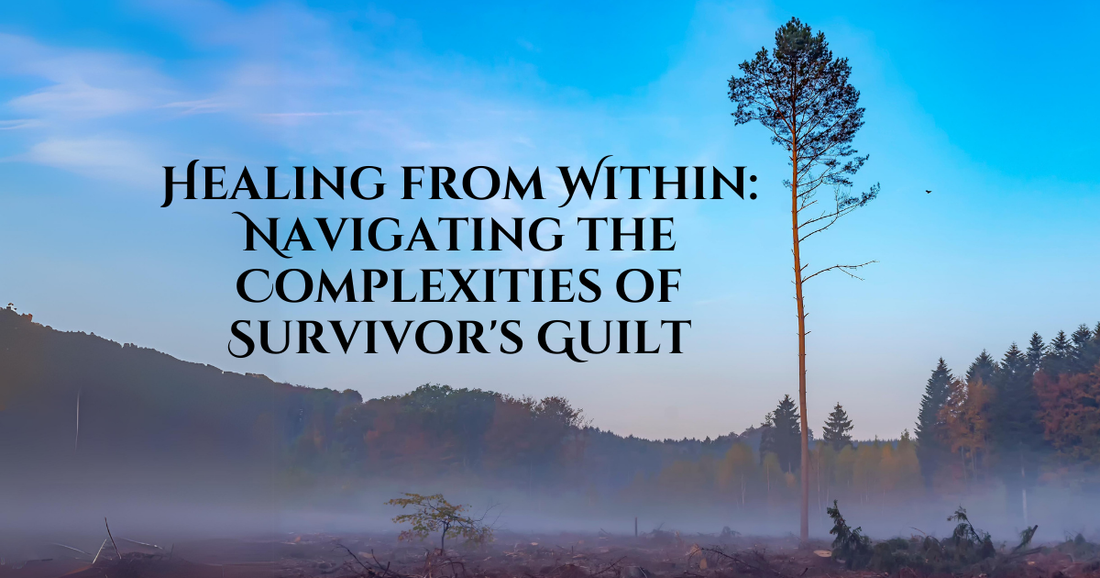
Healing from Within: Navigating the Complexities of Survivor's Guilt
Every day, I carry the weight of my survivor's guilt, a burden that becomes especially heavy when I confront the harsh reality of my cancer battle. When the diagnosis first came, the doctor's words echoed in my mind, "two to three years", a limited timeframe that pushed me to consider a stem cell transplant as a glimmer of hope for a few more years of life. The decision was difficult, and the guilt of potentially outliving others was a constant companion.
 As I navigate my fourth year of treatment, trying to savor life's moments with my granddaughters, I am acutely aware of the uncertainty that clouds my family's thoughts. My compromised immune system keeps them on edge, each sickness striking fear that it might escalate into something far more sinister and life-threatening. Witnessing the swift loss of my cousin's husband to cancer in just a month underscores the fragility of life and deepens my sense of survivor's guilt.
As I navigate my fourth year of treatment, trying to savor life's moments with my granddaughters, I am acutely aware of the uncertainty that clouds my family's thoughts. My compromised immune system keeps them on edge, each sickness striking fear that it might escalate into something far more sinister and life-threatening. Witnessing the swift loss of my cousin's husband to cancer in just a month underscores the fragility of life and deepens my sense of survivor's guilt.
Amidst the constant pain and endless chemotherapy, I can't shake the feeling of being lucky to be still alive while others face the cruel hands of fate. The weight of survival weighs heavy, a bittersweet mix of gratitude and sorrow that lingers with every passing day. Are these emotions normal?

Autism Butterfly T-Shirt and Kids Christmas Artic Animals T-shirt Available at Shop Wrenée™
Survivor's Guilt: A Common Emotion
Survivor's guilt is the emotional struggle individuals may face after experiencing a traumatic event, like a cancer diagnosis. Many cancer survivors grapple with feelings of guilt, particularly when they think about loved ones or friends who may have succumbed to the disease. According to Powers, this guilt can be complex and overwhelming, often resulting in feelings of unworthiness or self-blame.
Understanding and Accepting Your Feelings
The first step in healing from survivor's guilt is to acknowledge and understand the emotions you are experiencing. It's crucial to recognize that these feelings are not only normal but also valid. It is okay to grieve for those who may not have survived. Allowing yourself to process these emotions can help you move toward a place of healing and acceptance.
Processing Your Emotions
Actively processing your emotions is the next step in navigating survivor's guilt. You can do this through various therapeutic techniques, such as journaling about your feelings, talking to a trusted friend or therapist, or engaging in creative outlets like art or music. These activities can help you express your feelings healthily, gradually releasing the burden of guilt and paving the way for emotional healing.

Multiple Myeloma Awareness T-Shirt Available at Shop Wrenée™
Paying It Forward
One powerful way to cope with survivor's guilt is to pay it forward. By using your experience to help others through similar challenges, you can turn your guilt into a positive force for change. Whether volunteering at a cancer support group, sharing your story with others, or fundraising for cancer research, giving back can provide a sense of purpose and meaning in your healing journey.
Practicing Self-Care
Self-care is essential for anyone navigating survivor's guilt. It is important to prioritize your physical, emotional, and mental well-being by engaging in activities that bring you joy and relaxation. Whether exercising, meditating, spending time in nature, or indulging in a favorite hobby, taking care of yourself is crucial in overcoming guilt and finding peace.

Just Cure It Myeloma T-Shirt Available at Myeloma For Life™
Joining a Support Group
Connecting with others who have experienced similar challenges can be incredibly beneficial in healing from survivor's guilt. Joining a support group for cancer survivors can provide a safe space to share your feelings, receive validation and support, and learn coping strategies from others who are on a similar healing journey. By building a community of understanding and empathy, you can find strength and comfort in knowing you are not alone.

Seeking Professional Help
If feelings of survivor's guilt become overwhelming or interfere with your daily life, it may be beneficial to seek professional help. A therapist or counselor can provide the tools and support you need to navigate your emotions, develop healthy coping mechanisms, and work towards healing from within. Remember, it is okay to ask for help when you need it.
Survivor's guilt is a complex and challenging emotion that many cancer survivors may experience. By understanding and accepting your feelings, actively processing your emotions, paying it forward, practicing self-care, joining a support group, and seeking professional help, you can begin to heal from within and find peace in your survivorship journey. Remember, you are not alone; overcoming guilt and finding hope and healing on the other side is not just a possibility. It's a reality.
